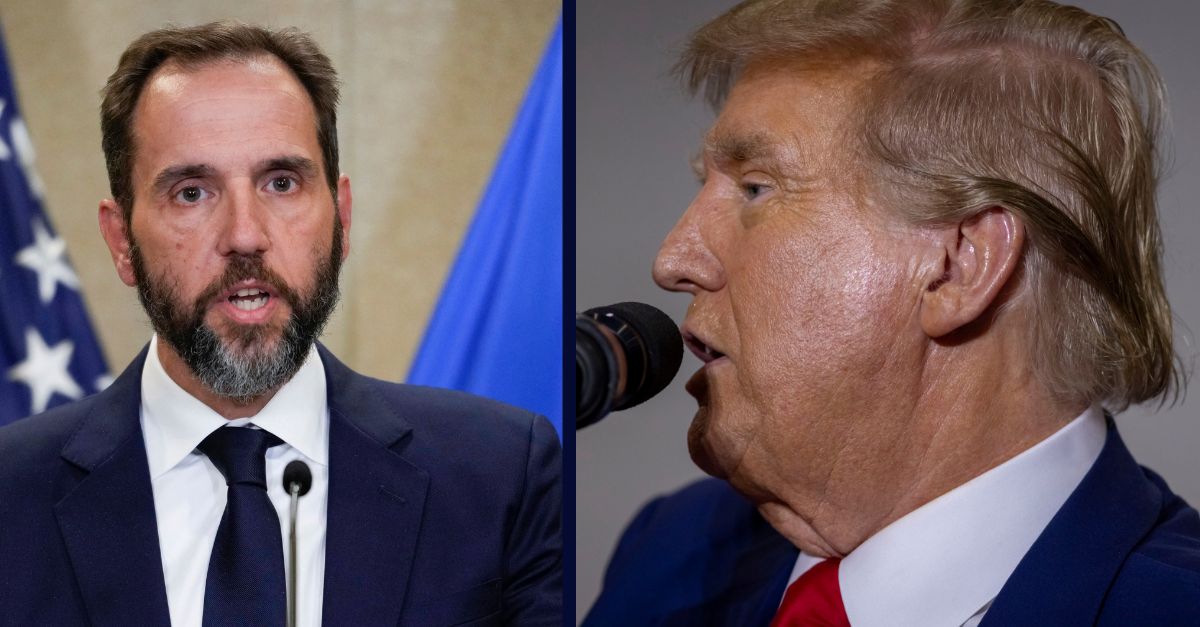
Left: Special counsel Jack Smith speaks to the media. (AP Photo/J. Scott Applewhite, File); Right: Republican presidential candidate former President Donald Trump speaks at a rally. (AP Photo/Mike Roemer)
Special counsel Jack Smith on Monday implored the judge in charge of former President Donald Trump’s Mar-a-Lago documents case not to force the government into complying with defense discovery motions.
In January, attorneys for the 45th president accused Smith and his office of myriad discovery violations in a rambling defense filing that also asserted that the genesis of the federal Florida case could be traced to “politically motivated operatives” within President Joe Biden’s administration who launched a “crusade” against their client to hamstring his chances in the 2024 presidential election.
In the government’s response in opposition, Smith aims to methodically pick apart each theory floated by the defense — while trying to convince U.S. District Judge Aileen Cannon that the alleged discovery violations are not only misplaced but irrelevant to the case.
“The defendants have received substantial, timely, and thorough discovery in this case,” the government’s response begins. “By early September 2023, the Government had provided the defendants with over 1.28 million pages of unclassified discovery and all of the CCTV footage obtained in the investigation; since then, the Government has supplemented its production as necessary. This production not only complies with the Government’s constitutional and rule-based discovery obligations; it goes far beyond.”
Trump, for his part, claims the prosecution has been withholding “exculpatory evidence in the hands of the senior officials” at multiple federal agencies including the FBI, the Department of Justice, the Office of the Director of National Intelligence, the Department of Energy, the National Security Agency, and the Department of State.
In their motion to compel discovery, the defense accused those unnamed officials of being engaged in a “lawless mission” to gin up charges against Trump over the retention of the documents in question — with a particular amount of disdain leveled at the intelligence community’s alphabet soup. And, for purposes of the case itself, Trump’s lawyers accused Smith of going along for the ride by failing to collect proof that members of the Biden administration had essentially put their whole hands on the scales of justice.
The special counsel rubbishes this tale of the case’s origins.
“The defendants rely on a pervasively false narrative of the investigation’s origins,” the response continues. “Their apparent aim is to cast a cloud of suspicion over responsible actions by government officials diligently doing their jobs. The defendants’ insinuations have scant factual or legal relevance to their discovery requests, but they should not stand uncorrected.”
Smith goes on to offer the state’s theory of the case.
“Put simply, the Government here confronted an extraordinary situation: a former President engaging in calculated and persistent obstruction of the collection of Presidential records, which, as a matter of law, belong to the United States for the benefit of history and posterity, and, as a matter of fact, here included a trove of highly classified documents containing some of the nation’s most sensitive information,” the filing reads. “The law required that those documents be collected. And the record establishes that the relevant government officials performed their tasks with professionalism and patience in the face of unprecedented defiance.”
The defense, echoing in somewhat subdued language Trump’s own electioneering complaints about the “witch hunts” he faces in various jurisdictions, argues there is, somewhere in the government’s archives or servers, “additional evidence of bias and political animus that is central to the defense” and which must be produced by Smith’s office.
Trump’s team is also seeking a “judicially enforced definition of the prosecution team” that would encompass known and unknown personnel at several of the above-named federal agencies.
The combined impact of the defense’s “bias and political animus” and “prosecution team” enlargement requests would likely substantially balloon the universe of potential discovery — and, in turn, increase the government’s concomitant discovery obligations.
Smith tells the court not to fall for it.
“[T]hey seek abstract rulings on the scope of the prosecution team and various directives that the Government provide them with a range of additional materials,” the government’s response reads. “The motion should be denied as legally and factually flawed. Discovery requests must be based on specific demands, tied to the case, for items material to preparing the defense. Instead of meeting those standards, the defendants’ motion seeks non-discoverable materials based on speculative, unsupported, and false theories.”
While getting into the merits of a case might be somewhat atypical in discovery battles, the monthslong back-and-forth pretrial docketing in the Mar-a-Lago case has also been atypical, with the defense being allowed wide latitude to plead their case by the judge — and the government feeling like they have no choice but to respond in kind.
Smith, sanguine by now to the in-depth nature of the motions pleading before the still far-off trial, wants to make sure Cannon shuts down the defense’s voluble complaints before a jury ever hears them.
To this end, the government argues, some of the complained discovery violations seem to be more like backdoor efforts to allow in evidence and arguments that would not otherwise be allowed at trial.
“The jury will not be asked to decide whether the investigation and prosecution of the case were ‘politically motivated and biased,’ whether there was ‘an abuse of the grand jury process,’ or whether there was some other ‘defect in instituting the prosecution,”” Smith’s filing goes on. “Ignoring this black letter law, defendants plan to make these precise issues ‘central’ to their defense at trial, and they say as much in their motion to compel.”
The government identifies six various forms of discovery which they more or less accuse the defenses of attempting to weaponize.
From the motion, at length:
(1) evidence of “improper coordination with NARA to abuse the grand jury process”; (2) evidence relating to “the attempt to retroactively terminate President Trump’s security clearance and related disclosures”; (3) evidence relating to the “use of secure facilities at President Trump’s residences”; (4) “evidence of bias and investigative misconduct”; (5) “all correspondence and/or communications concerning the search of Mar-a-Lago; and (6) “CCTV footage”
“Each request (to the extent it seeks evidence that has not already been turned over) fails to establish one or more of the requirements for a motion to compel — namely, that the evidence sought must be material to the defense; must be within the Government’s possession, custody, or control; and must not be protected from disclosure by an applicable privilege,” Smith sums up before later concluding: “For all of these reasons, the Court should [sic] defendants’ motions to compel in their entirety.”
Have a tip we should know? [email protected]





